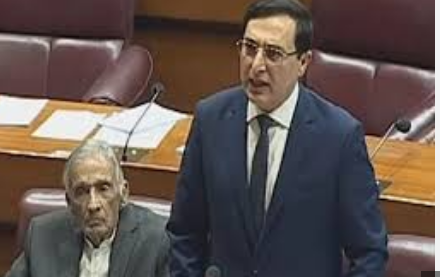Islamabad (Web Desk): Pakistan Tehreek-e-Insaf (PTI) Chairman Barrister Gohar Ali Khan called for a path toward reconciliation and dialogue, stressing that the unrest from May 9 must be brought to a close.
Speaking on the floor of the lower house of the parliament, he urged the parliament to help facilitate negotiations and emphasized that PTI sought accountability, but through a constructive conversation within the legislative body.
He made it clear that the formation of a committee to discuss the issue should not be misconstrued as a sign of weakness.
Gohar said that if the government continued to block negotiations, PTI would have no choice but to take their protests back to the streets.
"Do not force us to return to the streets," he cautioned, while advocating for a parliamentary committee meeting to settle the tensions surrounding May 9.
He stressed that it was time for the "dust to settle" on those events and for the country to move forward.
Drawing comparisons to protests in other countries, such as Brazil, where demonstrators entered government buildings without resorting to violence, Gohar questioned why, in Pakistan, peaceful protests were met with gunfire.
He criticised the government's narrative, particularly the defense minister's claim that the violence was instigated by PTI’s Ali Amin Gandapur's security personnel, calling the suggestion absurd.
Gohar insisted that the government had refused to acknowledge the use of force against protesters and had failed to provide any reasonable explanation.
The PTI leader also revisited previous incidents of government responses to protests, noting the tragic loss of life when Sharia law was enforced in the past.
He wondered why the government had been quick to offer apologies and forgetfulness in those instances, but had failed to show similar empathy for the victims of recent violence.
Gohar also rejected accusations that PTI was playing the "Pashtun card" in its protests, asserting that those who took to the streets were unarmed and were protesting out of genuine frustration, not political manipulation.
He dismissed suggestions that PTI was using its protests to boost the popularity of its leader, Imran Khan, emphasizing that his popularity was already proven, citing the massive turnout at party’s February 8 rally.
"Imran Khan does not need rallies to prove his popularity," he said.
On Tuesday, the National Assembly session also saw a heated exchange between the ruling Pakistan Muslim League-Nawaz (PML-N) and the opposition, with Opposition Leader Omar Ayub accusing Prime Minister Shehbaz Sharif of ordering the military to fire on PTI protesters during the November 26 standoff.
Refuting the claim, Defense Minister Khawaja Asif, questioned the opposition's shifting statements and their failure to provide any evidence of the casualties they had reported.
Asif also pointed out the lack of consistency in the opposition’s narrative, particularly in regard to the number of deaths, which PTI had variously reported as ranging from 12 to over 250.
The continued clash between the government and opposition revealed the deepening divide and a lack of resolution on the events of November 26.


